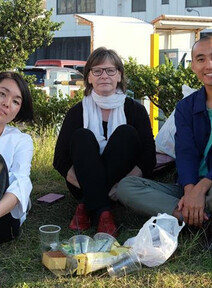hankyoreh
Links to other country sites 다른 나라 사이트 링크
[Interview] German professors lash out at local authorities for trying to remove comfort women statue

“I am shocked at the attitude of the German Federal Foreign Office and Berlin officials in response to pressure from the Japanese government. Civil society needs to respond as a supranational network to this right-wing network [waging a ‘war of memory’ over historical issues]. If only for the sake of that goal, the statue needs to remain where it is.”
In an email interview with the Hankyoreh on Oct. 11, Steffi Richter, a professor of Japanese studies at Leipzig University, was vehement in denouncing the actions of the German Foreign Office and the presiding office of Berlin’s Mitte borough in bowing to pressure from Japan to remove a statue symbolizing victims of wartime sexual slavery by Japan. A German Japanologist, Richter is closely acquainted with the revisionism of Japan’s “new right” in areas such as Japanese history textbooks.
“The period since the mid-1990s has seen the emergence of various right-wing groups in Japan that deny the war crimes committed by the Japanese military,” she noted.
“They’ve been mostly active in the areas of politics and diplomacy. The attempts since 2011 to remove comfort women statues from different locations around the world and the recent application of pressure regarding the statue in Berlin are all related to this reactionary network,” she added.
Many other Japanologists in Germany besides Richter see the battle surrounding the statues as part of a “war of memory” being waged over historical issues around the world by members of Japan’s new right. It’s an attitude that was also reflected in a piece published on the website of Leipzig University’s Japanese studies department on Oct. 5 by doctoral student Dorothea Mladenova, who criticized the statue’s removal.
“To claim that the comfort women issue is a diplomatic and political issue between the two countries is a misguided attitude that disregards the issue of violence committed against women,” she wrote.

Similar efforts have continued among extreme right-wing forces in Germany, where whitewashing of the country’s Nazi history is prohibited. When asked in an email interview with the Hankyoreh on Oct. 11 why the comfort woman statues are needed in Germany, Ilse Lenz, a former professor of sociology at the Ruhr-University Bochum, replied, “As a country with a history of colonialism and wartime violence, Japan is faced with similar issues to Japan’s.”
“The statues are symbols of the remembrance campaign recalling wartime sexual violence and colonialism,” Lenz explained.
“Our job is to understand the brutal past of the colonial era and the countless instances of sexual violence that occurred in Eastern Europe and Russia during World War II,” she stressed.
Lenz was harshly critical of the revocation of the statue’s approval, which she called an “unacceptable occurrence that resulted not only from diplomatic pressure by the Japanese government, but also from the city of Berlin’s failure to properly understand the comfort women issue and the issue of wartime sexual violence.”
By Nam Eun-joo, Berlin correspondent
Please direct comments or questions to [english@hani.co.kr]

Editorial・opinion
![[Column] Park Geun-hye déjà vu in Yoon Suk-yeol [Column] Park Geun-hye déjà vu in Yoon Suk-yeol](https://flexible.img.hani.co.kr/flexible/normal/500/300/imgdb/original/2024/0424/651713945113788.jpg) [Column] Park Geun-hye déjà vu in Yoon Suk-yeol
[Column] Park Geun-hye déjà vu in Yoon Suk-yeol![[Editorial] New weight of N. Korea’s nuclear threats makes dialogue all the more urgent [Editorial] New weight of N. Korea’s nuclear threats makes dialogue all the more urgent](https://flexible.img.hani.co.kr/flexible/normal/500/300/imgdb/original/2024/0424/7317139454662664.jpg) [Editorial] New weight of N. Korea’s nuclear threats makes dialogue all the more urgent
[Editorial] New weight of N. Korea’s nuclear threats makes dialogue all the more urgent- [Guest essay] The real reason Korea’s new right wants to dub Rhee a founding father
- [Column] ‘Choson’: Is it time we start referring to N. Korea in its own terms?
- [Editorial] Japan’s rewriting of history with Korea has gone too far
- [Column] The president’s questionable capacity for dialogue
- [Column] Are chaebol firms just pizza pies for families to divvy up as they please?
- [Column] Has Korea, too, crossed the Rubicon on China?
- [Correspondent’s column] In Japan’s alliance with US, echoes of its past alliances with UK
- [Editorial] Does Yoon think the Korean public is wrong?
Most viewed articles
- 1‘We must say no’: Seoul defense chief on Korean, USFK involvement in hypothetical Taiwan crisis
- 2N. Korean delegation’s trip to Iran shows how Pyongyang is leveraging ties with Moscow
- 3Amnesty notes ‘erosion’ of freedom of expression in Korea in annual human rights report
- 4[Column] Park Geun-hye déjà vu in Yoon Suk-yeol
- 5‘Weddingflation’ breaks the bank for Korean couples-to-be
- 6[Reportage] On US campuses, student risk arrest as they call for divestment from Israel
- 7[Editorial] New weight of N. Korea’s nuclear threats makes dialogue all the more urgent
- 8Korea sees more deaths than births for 52nd consecutive month in February
- 9Will NewJeans end up collateral damage in internal feud at K-pop juggernaut Hybe?
- 10Why Korea shouldn’t welcome Japan’s newly beefed up defense cooperation with US